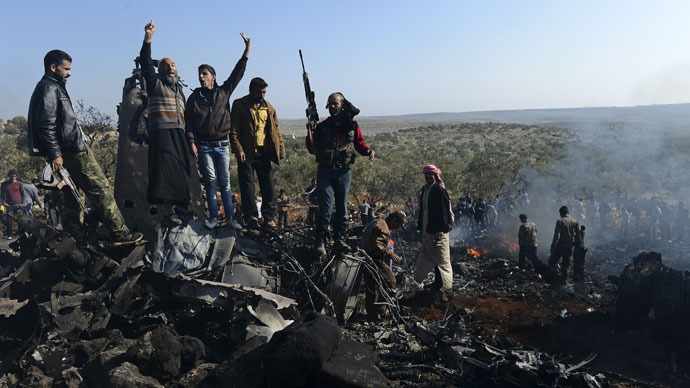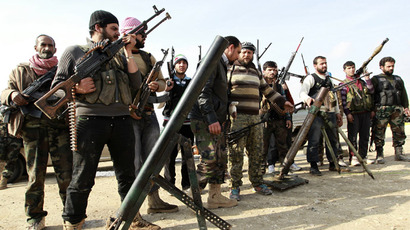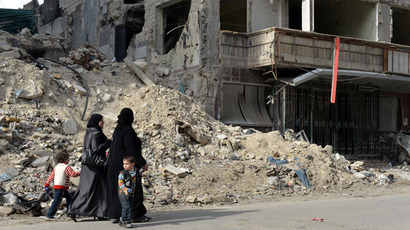EU arms embargo on Syria: Scrap it or drop ‘non-lethal’ wording, says UK

The UK has offered EU diplomats a choice between two options of amending the arms embargo on Syria in order to legally unleash a stream of lethal aid to the opposition. The draft proposal emerged as Britain and the US seek Russia’s political support.
The UK has been on a crusade to start arming the Syrian
opposition and has lobbied hard in Brussels to amend the arms
embargo placed on Damascus.
In a leaked six-page long draft proposal circulated to EU diplomats
over the past week, London is suggesting two options for amending
current sanctions to give weapons to the Syrian National
Coalition.
The paper says the situation in Syria is “deteriorating
sharply” and the EU must apply more pressure on the Assad
government to negotiate.
The first option pushes for full exemption of the main
opposition bloc from the EU arms embargo, while the second proposal
is to amend the language of the sanctions to remove the word
“non-lethal” thus opening the gate for weapons to
flow.
Such a move would, the paper says, strengthen the opposition and “head off any reliance by the moderate Syrian opposition on Islamist-backed armed groups.”
The UK also argues that such an approach would place the EU in a
better position to fight potential use of chemical weapons.
“Crucially, it will ensure we can respond flexibly to a major
escalation in the conflict, such as chemical weapon attacks,”
the paper added.
Another idea is to ease financial transactions by amending bank
sanctions to rebel-held territory.

The EU is divided on the issue whether to adopt the
British proposal which is also showing strong support from the
French. The fierce debate in Brussels intensified after US Defense
Secretary Chuck Hagel stated that Washington is rethinking its
position on providing arms to the opposition, saying “arming the
rebels — that’s an option.”
Discussions over lifting the embargo are expected to continue until
the deadline of June 1. EU foreign ministers are scheduled to
discuss the matter on May 27. Last month the EU agreed to allow
purchases of oil from the opposition, lifting the sanctions
originally imposed in May 2011.

Spain, Austria and Sweden are worried that lifting the ban on
arms sales will further destabilize the situation as it could arm
al-Qaeda linked terrorist cells such as the al-Nusra Front.
Austria for instance says that it might be forced to recall its
troops from the UN peacekeeping force in the Golan Heights, because
it would challenge EU's impartiality.
Britain argues that only the Syrian National Coalition will
receive the weapons and if the EU allows arms sales, it would need
to monitor how any equipment was used.
“We have worked over many months to build effective relations
with the opposition and have gradually extended our network of
contacts. We already identify the recipients of any assistance very
carefully,” UK said.
Germany, the diplomats say could be open for compromise on the
issue, but is discussing how to alter financial restrictions to
help the rebels and pressure Assad.
Russia has recently warned the EU not to lift its arms embargo.
In Late April, Russian foreign minister, Sergey Lavrov said if the
embargo is removed, “the international obligations of the EU
countries, which prohibit supplies of arms and ammunition to
non-government actors, are not going anywhere.”
On Tuesday, Russia and the US reiterated their commitment to
bringing all sides of the Syrian conflict for talks and announced
an international conference to be called by the end of May which
will serve as a follow-up to the Geneva Communiqué, the current
peace road-map.
Although talking peace, the US at the same time is considering
the possibility of arming the opposition. The future of a bill
recently introduced to the US Congress depends on “the state of the
evidence in respect to chemical weapons” US Secretary of State John
Kerry said after meeting with Russia’s President Putin and Foreign
Minister Lavrov.
Meanwhile, the Syrian National Coalition, the main benefactor
from a potential lifting of the arms embargo, has welcomed the
US-Russian negotiations.
“The National Coalition welcomes all international efforts
which call for a political solution to achieve the aspirations of
the Syrian people and their hope for a democratic state, so long as
they begin with the departure of Bashar al-Assad and his
regime.”

British Prime Minister David Cameron has also welcomed the
results of the negotiations and is scheduled to have discussions
with President Putin in Russia on Friday.
But at the same time, Cameron once again accused the Syrian forces
of using chemical weapons.
“There is a growing body of limited but persuasive information
showing that the regime has used and continues to use chemical
weapons including sarin and the room for doubt about this continues
to diminish,” Cameron told parliament.
This, despite recent revelations by a leading United
Nations investigator, Carla del Ponte who stated that their probe
found “strong, concrete suspicions but not yet incontrovertible
proof” that it’s the rebels, not President Bashar Assad‘s forces,
who have used chemical weapons.














